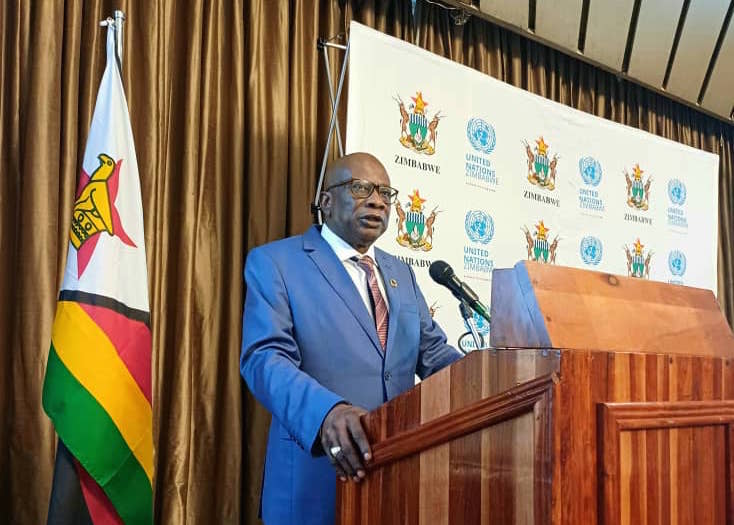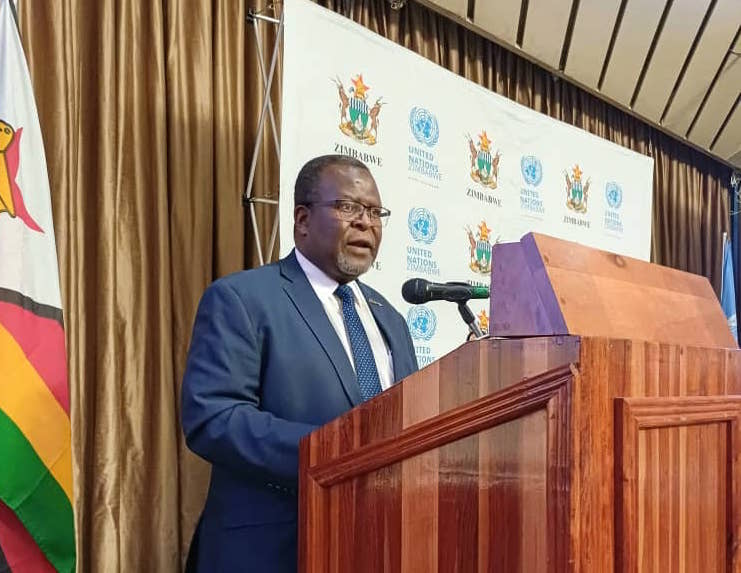|
Getting your Trinity Audio player ready...
|
The Zimbabwe United Nations Sustainable Development Cooperation Framework (ZUNSDCF) has been a vital cog in the collective effort to achieve Vision 2030, as enunciated by His Excellency, President Dr. Emmerson D. Mnangagwa of becoming a Prosperous and Empowered Upper-Middle Income Society by 2030 as well as attaining the global aspirations of the transformation and universally accepted Sustainable Development Goals (SDGs).
These were sentiments by Reverend Paul Damasane, the Deputy Chief Secretary to the President and Cabinet at the ZUNSDF Annual Review Meeting held in Harare on 14 March 2024.
“The United Nations Country Team in Zimbabwe has been an invaluable partner of the Government of Zimbabwe in our collective effort to achieve our Vision 2030, as enunciated by His Excellency, President Dr. Emmerson D. Mnangagwa of becoming a Prosperous and Empowered Upper-Middle Income Society by 2030 as well as attaining the global aspirations of the transformation and universally accepted Sustainable Development Goals.
“To achieve the country’s Vision 2030, the Government of Zimbabwe has been implementing the National Development Strategy 1 (NDS1) which runs from 2021 and comes to an end in 2025. It is pleasing to note that the UN Country Team has been buttressing these efforts through the Zimbabwe UN Sustainable Development Cooperation Framework: 2022-2026, which is anchored on NDS1. This is a welcome indication that the Government of Zimbabwe and the Country Team have shared goals and priorities and are working together to achieve them, in order to improve the lives of the people of Zimbabwe,” Rev Damasane said.
Both NDS1 and the Cooperation Framework have adopted devolution and decentralization as a means to achieve the UN and the country’s collective goals.
Under this approach, the Government has embarked on a deliberate initiative to devolve governmental responsibilities to provincial and local authorities. To capacitate provincial and local authorities to be able to effectively contribute to their development, at least 5% of national revenue raised in any financial year, is allocated to them. Further, the Government takes seriously, its responsibility to equip the people and authorities at the grassroots level, with the skills and resources to enable them to become economic participants, and not just beneficiaries.
In his remarks, the United Nations Resident and Humanitarian Coordinator, Mr. Edward Kallon said as we have passed the halfway mark to 2030, the promises enshrined in the Sustainable Development Goals (SDGs) are in peril.

He said the world confronts a multitude of crises, including climate-change-induced emergencies, armed conflicts, a pessimistic global economic forecast, and enduring repercussions from the COVID-19 pandemic. This situation serves as a stark warning, necessitating immediate and intensified actions to steer the Goals back on course.
In 2021, the Government of Zimbabwe and the United Nations in Zimbabwe, signed the Zimbabwe United Nations Sustainable Development Cooperation Framework (ZUNSDCF 2022-2026), a strategic engagement of the UNCT in Zimbabwe to support the country in achieving Sustainable Development Goals.
The ZUNSDCF is anchored on the Zimbabwe National Development Strategy 1 (2021-2025) and underscores the critical importance of achieving tangible sustainable results for the people of Zimbabwe. It reflects a collective dedication to inclusive participation and addressing the needs of marginalized populations, thereby ensuring that no one and no place is left behind.
The ZUNSDCF sets out to promote the rights of all people in Zimbabwe by improving access to equitable and high-quality social services and protection. It also seeks to bolster environmental stability, support sustainable food systems, and foster healthy lives and livelihoods for all. Additionally, it aims to foster inclusive and sustainable economic growth, creating decent employment opportunities for everyone. Lastly, the framework emphasizes the importance of enhanced accountability, the rule of law, human rights, and access to justice.
“As we move into the third year of the implementation of the ZUNSDCF, it’s essential to underscore the critical role of results monitoring and reporting. By diligently tracking our progress towards the results outlined in the framework, we ensure accountability and transparency in our actions. Effective monitoring also allows us to identify areas where interventions are succeeding and areas that require adjustment. Through robust monitoring and reporting mechanisms, we can measure our impact, learn from our experiences, and ultimately drive meaningful change for the people of Zimbabwe.
“Timely access to high-quality, disaggregated data is paramount for effective monitoring and results reporting. By accurately using data, we gain insight into our progress towards advancing the rights of all people in Zimbabwe, ensuring equitable access to social services, fostering environmental stability, and promoting sustainable livelihoods. Data serves as our compass, guiding us to where interventions are succeeding and where adjustments are needed for both the NDS1 and the Cooperation Framework and ultimately driving us closer to achieving the SDGs,” Mr. Kallon said.
The Annual Performance Review process is to collectively assess stakeholders’ achievements, challenges, opportunities, lessons learned, and priorities for the year 2024.
“This collaborative discussion serves as a pivotal platform directing the United Nations’ involvement and assistance in the implementation of NDS 1, with the overarching goal of fostering sustainable development and inclusivity. It is imperative that each of us actively engages in this process, ensuring a comprehensive assessment of our progress and consensus on the critical priorities that will guide the implementation of the Cooperation Framework,” Mr. Kallon added.






